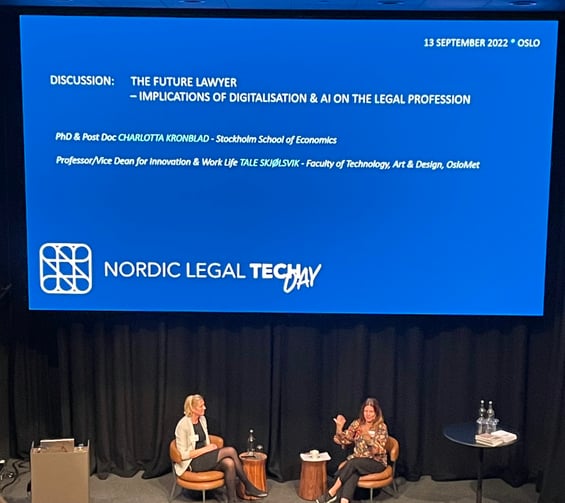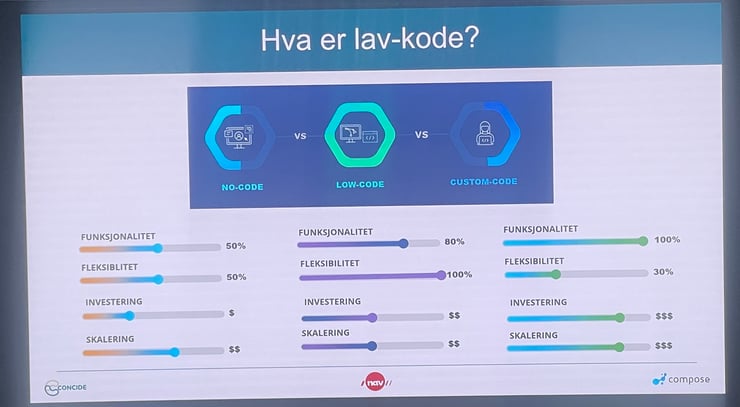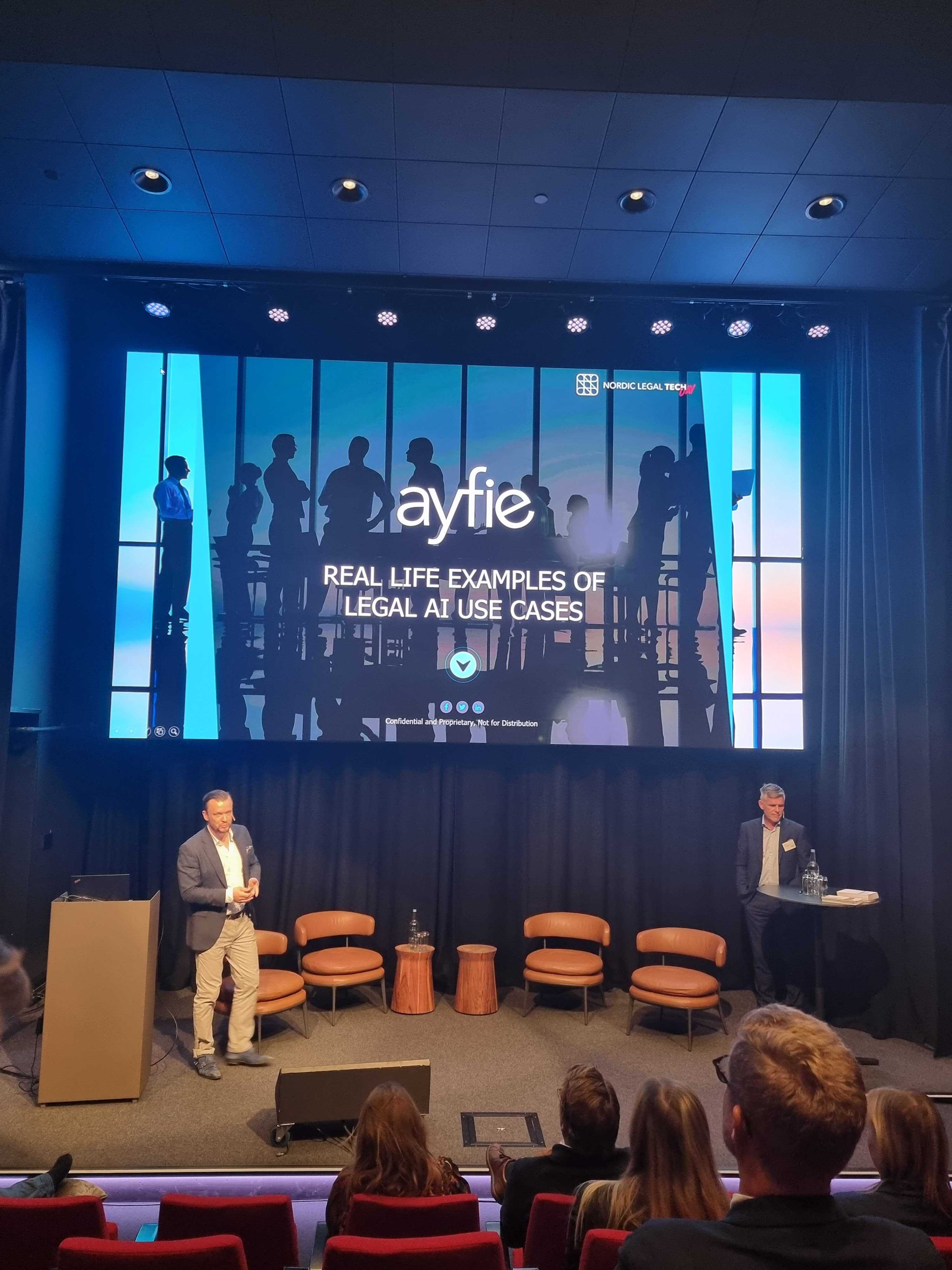Why Lawyers Should Do Low-Code/no-Code
 By
Ayfie
·
4 minute read
By
Ayfie
·
4 minute read
We had the pleasure of attending the Oslo edition of the Nordic Legal Tech Day event on September 13, with about 200 attendees ranging from lawyers, senior executives, tech professionals and partners presenting technology solutions tailored to the legal industry or to a specific need such as CRM, compliance, legal publications, or data classification.
With more than 25 speakers on stage, the agenda for the day was divided between the following four topics: Future Lawyer, ESG, Innovation, AI.
 Charlotta Kronblad and Tale Skjølsvik at Oslo Legal Tech Day
Charlotta Kronblad and Tale Skjølsvik at Oslo Legal Tech Day
The future lawyer knows technology inside out
The first discussion to warm us up featured Tale Skjølsvik (Professor/Vice Dean for Innovation & Work Life, Oslo Metropolitan University) and Charlotta Kronblad (PhD & Post Doc, Stockholm School of Economics). It didn’t take long to understand that legal tech has matured a lot in the past years. The ecosystem of partners, technology players, law firms with their own innovation hub and collaborations across industries shows and tells us how much potential there is when combining great heads and the right technology.
The future of lawyers, however, is still very uncertain, as the rise of systems and technology that can decide for you (us, the users), based on data and algorithms are being purchased and blindly trusted in countries such as our neighbouring country Sweden. It doesn’t mean that we should not test and leverage such solutions; it is rather a question of having the complete understanding of the specific technology in place, which should be made available either in available documentation or as open source.
Last year’s focus was AI. This year, it is all about automation and real tech examples.
The SDG (Social Development Goals) were at the center of the ESG track and EY presented a framework on how these affect the legal sector and explained the complexity behind these for both companies and their clients. R8ME took this discussion to the next level as they have developed an MVP (Minimum Viable Product) of a system that simplifies and makes sustainability measurements available for all small and medium-sized businesses.
NAV shared the stage with Compose Software presenting their learnings about the outcome of when you automate small pieces of a bigger process and the differences between rule-based systems and AI technology. Their recommendation was a very clear one; everyone and every company should do low-code//no-code today. Start with your high-quality data and test and see the vast opportunities that lay within these low-code/no-code platforms.
 NAV and Compose argue everyone should do low-code.
NAV and Compose argue everyone should do low-code.
Another great presentation was from Statsbygg and their CDO Cathrine Mørch who talked about how the accessibility and the cost of technology have changed so drastically that these are now a driver for accelerating the digitalization and product development. Being in the construction sector that represents more than 40% of the global climate emissions, change is the only option and ESG is at the very top of their priorities.
Balancing already existing solutions
Culture and relationships were also mentioned by several of the speakers. After all, innovation cannot happen without a strong human foundation and good relationships across teams. Although there are still the classical silos between departments and the fact that covid made us more hybrid (working less in the office and more from home), technology is much more mature and represents more viable solutions than before. This resonates with the client focus discussion Salesforce led with the panelists from Thommessen, Simonsen Vogt Wiig and Stretch. It’s so easy to sign-up and purchase new services, however it is still equally important to use the toolbox each company has, instead of adding more applications to the already long list.
AI and law
AI was the fourth and last topic of the day and packed with intriguing speakers. Simula Consulting does research on how to make AI available to everyone and showcased how AI is being used in detecting and classifying fish (as local Atlantic salmon is threatened by pink salmon). Another example their CEO Valerya Naumova shared was from the Ministry of Education in Singapore who is using NLP to extract hot topics and keywords in the chat messages on their website. The overall message from Simula was quite clear:
AI can take over repetitive tasks, making data-driven decisions, performing diverse types of Due Diligence processes, which then assists the users in their job. Detection and classification done by a machine will be faster, smarter, and error free than when a human does it.
With great opportunities come even greater responsibility. The latter is reflected in the legal obligations that we (companies and tech providers) need to comply with in the new European directive that is looking at regulating AI. Despite the latter not yet being voted in and approved of, we will have to implement a set of requirements and follow strict guidelines in order not to violate privacy and human rights. Digital Norway, represented by their CTO Eirik Andreassen, gave a few notable examples of how extreme situations we as consumers can potentially find ourselves in, where high-tech solutions decide our fate and future. How this new European “playbook” of rules related to AI regulation will look like we will know more about in 2023.
We (Ayfie) were lucky to have our CEO Herman Sjøberg together with our client Kvale, represented by Partner Per-Kaare Svendsen, to talk about how the NLP and AI landscape is today and how companies such as Kvale leverage these solutions. If you want to read more about the highlights and watch a short video of this insightful talk then check out What Kvale & Ayfie presented.

To summarize the day, we have dived deep into four extremely interesting topics related to legal tech, and it was a truly clear red thread throughout the insight and learnings presented. We are facing more uncertainty and disruption as consumers and companies demand more from each other and the speed at which technology is moving is exponential.
The fascinating aspect of this, for us as vendor working with NLP and ML, is that it is extremely neat to finally see the real value that the right solutions can bring to users today.
Nevertheless, if we are using solutions to enhance our capabilities and boost our skillset (I.e., we are not being replaced, we are being assisted) then we are still dependent on good old culture, relationships, and collaboration to make the ecosystem work.